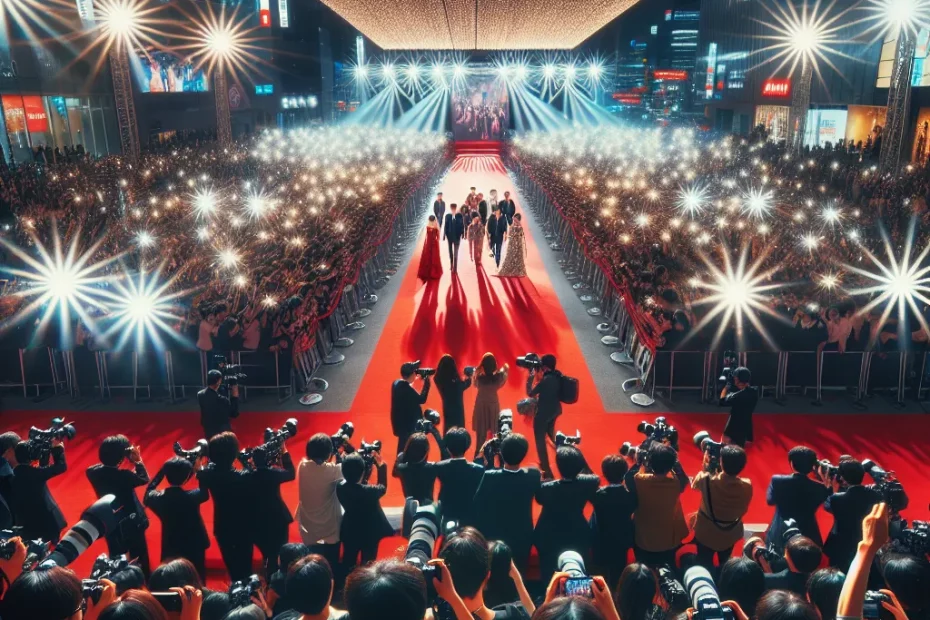Korean cinema has undergone a remarkable evolution over the decades, shaping not only the local film industry but also leaving a significant mark on the global cinematic landscape. From classic films that have stood the test of time to the modern Hallyu Wave that has captured the hearts of audiences worldwide, Korean cinema has continuously pushed boundaries and set new standards. Exploring the themes and trends prevalent in Korean films offers a unique insight into the rich cultural tapestry of the nation. The rise of the Hallyu Wave, fueled by the popularity of K-dramas and K-pop, has further solidified Korea’s position as a cultural powerhouse. As we delve into the profound impact of Korean cinema on pop culture, it becomes evident that its influence transcends borders and continues to inspire audiences across the globe.

Evolution of Korean Cinema over the Decades
In the realm of global cinema, Korean cinema has made a remarkable journey over the decades, evolving and transforming in ways that have captivated audiences worldwide. From its humble beginnings in the early 20th century to the modern-day powerhouse of the Hallyu Wave, Korean cinema has left an indelible mark on the industry.
The Golden Age: 1950s and 1960s
The 1950s and 1960s marked the golden age of Korean cinema, with the production of classic films that laid the foundation for what was to come. Directors like Shin Sang-ok and Kim Ki-young pioneered new storytelling techniques and visual styles, setting the stage for the industry’s growth.
Transition and Experimentation: 1980s and 1990s
Fast forward to the 1980s and 1990s, a period of transition and experimentation for Korean cinema. The industry faced challenges, but also saw the emergence of new talents like Park Chan-wook and Bong Joon-ho, who would later become internationally acclaimed directors.
The Renaissance: Early 2000s
By the early 2000s, Korean cinema had undergone a renaissance, with a string of critically acclaimed films garnering attention at prestigious film festivals around the world. Movies like “Oldboy” and “Memories of Murder” showcased the bold and innovative storytelling that Korean filmmakers had to offer.
The Hallyu Wave: 2010s
The 2010s brought about the rise of the Hallyu Wave, a cultural phenomenon that saw Korean cinema, music, and television spreading across the globe. Blockbusters like “Train to Busan” and “Parasite” broke box office records and won prestigious awards, solidifying Korea’s position on the world stage.
Today, Korean cinema continues to push boundaries and defy expectations, with a diverse range of genres and styles captivating audiences of all backgrounds. The industry’s commitment to storytelling and innovation ensures that it will remain a powerhouse in the global cinematic landscape for years to come.
From classic films of the past to the modern-day marvels of the Hallyu Wave, Korean cinema’s evolution over the decades is a testament to the creativity and vision of its filmmakers. As we look to the future, one thing is certain – the world will continue to be enthralled by the magic of Korean cinema! 🌟🎥
Influence of Korean Cinema on Global Film Industry
Korean cinema has undeniably made a significant impact on the global film industry, transcending borders and captivating audiences worldwide 🎬. From classic films that have garnered critical acclaim to the widespread popularity of the Hallyu Wave, Korean cinema has proven its influence and staying power in the international entertainment scene.
Unique Storytelling and Innovative Filmmaking
One of the key aspects that sets Korean cinema apart is its unique storytelling and innovative filmmaking techniques 🌟. Directors like Bong Joon-ho, Park Chan-wook, and Lee Chang-dong have gained recognition for their bold narratives and visually stunning cinematography, pushing the boundaries of traditional filmmaking. This creativity and originality have not only earned them prestigious awards at renowned film festivals but have also inspired filmmakers around the globe to think outside the box.
Box Office Success and Audience Reception
Moreover, the success of Korean cinema can be quantified through box office numbers and audience reception 📈. Blockbusters like “Parasite,” “Train to Busan,” and “Oldboy” have not only achieved commercial success domestically but have also resonated with international viewers, breaking records and winning over hearts worldwide. The ability of Korean films to connect with diverse audiences speaks volumes about their universal themes and emotional depth.
Rise of the Hallyu Wave
The rise of the Hallyu Wave, fueled by the popularity of K-dramas and K-pop, has further propelled Korean cinema onto the global stage 🌏. The infectious charm of Korean entertainment has led to an increased interest in Korean films, with audiences eagerly seeking out more diverse content beyond mainstream Hollywood productions. This cultural phenomenon has not only boosted the visibility of Korean filmmakers but has also opened doors for collaborations and co-productions on an international scale.
Continued Influence and Future Outlook
In conclusion, the influence of Korean cinema on the global film industry is undeniable and continues to grow stronger with each passing year 🌟. Through its captivating storytelling, innovative filmmaking, and cultural resonance, Korean cinema has solidified its position as a powerhouse in the world of cinema, inspiring and captivating audiences around the globe. As we look to the future, one thing is certain – the impact of Korean cinema will continue to shape and redefine the landscape of global filmmaking for years to come.
Exploring Themes and Trends in Korean Films
Korean cinema has made a significant impact on the global stage, captivating audiences with its unique storytelling, compelling characters, and visually stunning cinematography. From classic films that have garnered critical acclaim to the modern phenomenon of the Hallyu Wave, Korean cinema continues to push boundaries and explore a wide range of themes and trends that resonate with viewers worldwide.
Exploration of Family Dynamics
One of the recurring themes in Korean films is the exploration of family dynamics and relationships. Many Korean movies delve deep into the complexities of familial bonds, portraying the struggles, conflicts, and love that exist within families. Films like “Ode to My Father” and “The Housemaid” showcase the emotional rollercoaster of family life, highlighting the sacrifices and challenges that come with it.
Examination of Social Issues
Another prevalent theme in Korean cinema is the examination of social issues and injustices. Directors often use their films as a platform to shed light on pressing societal issues such as class disparity, corruption, and political unrest. Movies like “Parasite” and “The Attorney” tackle these themes head-on, sparking important conversations and provoking thought among audiences.
Distinct Stylistic Trends
In addition to themes, Korean films also exhibit distinct stylistic trends that set them apart in the world of cinema. The use of vibrant colors, intricate storytelling techniques, and unexpected plot twists are common features found in many Korean movies. Directors like Bong Joon-ho and Park Chan-wook are known for their visually striking films that challenge traditional storytelling norms and captivate viewers from start to finish.
The rise of the Hallyu Wave, or the Korean Wave, has further propelled Korean cinema onto the international stage, introducing a new generation of audiences to the diverse and dynamic world of Korean films. With the popularity of K-dramas and K-pop music, Korean cinema has experienced a surge in global interest, leading to collaborations with Hollywood and other international film industries.
As Korean cinema continues to evolve and innovate, one thing remains constant – its ability to touch hearts, provoke thought, and inspire audiences around the world. Whether through classic masterpieces or contemporary blockbusters, Korean films have cemented their place in the annals of cinematic history, leaving an indelible mark on the cultural landscape for years to come. 🎬🌟
In conclusion, exploring the themes and trends in Korean films offers a glimpse into the rich tapestry of storytelling, creativity, and artistry that defines this vibrant industry. From family dramas to social commentaries, Korean cinema continues to push boundaries and captivate audiences with its unique blend of heartwarming narratives and thought-provoking themes. So grab some popcorn, sit back, and immerse yourself in the world of Korean cinema – you won’t be disappointed! 🍿🇰🇷
Rise of Hallyu Wave and its Impact on Pop Culture
The Origins of Hallyu Wave
The Hallyu Wave, which translates to “Korean Wave,” first gained momentum in the late 1990s and early 2000s with the export of Korean dramas to neighboring Asian countries. Dramas like “Winter Sonata” and “Jewel in the Palace” captivated audiences with their compelling storylines and talented actors, sparking interest in Korean entertainment across Asia.
The Rise of K-pop
One of the driving forces behind the Hallyu Wave has been the global success of K-pop music. With groups like BTS, BLACKPINK, and EXO dominating the charts and breaking records, K-pop has become a cultural phenomenon with a dedicated fanbase known as “K-pop stans.” These fans not only support their favorite groups but also drive trends in fashion, beauty, and social media.
Impact on Pop Culture
The impact of the Hallyu Wave on pop culture cannot be overstated. Korean beauty products, fashion trends, and even food have gained popularity worldwide thanks to the influence of Korean entertainment. K-dramas have introduced audiences to Korean language and culture, leading to an increased interest in learning Korean and studying abroad in South Korea.
Economic Influence
Beyond its cultural impact, the Hallyu Wave has also had a significant economic influence. The Korean entertainment industry has seen tremendous growth in recent years, with exports of K-pop music, dramas, and films bringing in billions of dollars in revenue. This has not only boosted the Korean economy but also created job opportunities and increased tourism to South Korea.
Future of Hallyu Wave
As the Hallyu Wave continues to make waves around the world, its future looks bright. With new K-pop groups debuting, innovative Korean dramas being produced, and Korean films receiving international acclaim, the influence of Hallyu on pop culture shows no signs of slowing down. As fans eagerly await the next big hit from Korea, one thing is certain: the Hallyu Wave is here to stay.
In conclusion, the Rise of Hallyu Wave has had a profound impact on pop culture worldwide, introducing audiences to the beauty and creativity of Korean entertainment. From K-pop music to Korean dramas, the Hallyu Wave has captured the hearts of fans everywhere and shows no signs of slowing down. So, whether you’re a die-hard K-pop stan or a casual viewer of Korean dramas, one thing is clear: the Hallyu Wave is a cultural force to be reckoned with! 🌟🎶📺
In conclusion, the evolution of Korean cinema from classic films to the global phenomenon of the Hallyu Wave has significantly impacted not only the film industry but also global pop culture. The themes and trends explored in Korean films have captured the hearts of audiences worldwide, showcasing the rich cultural heritage and storytelling prowess of Korean filmmakers. The rise of the Hallyu Wave has further solidified Korea’s position as a powerhouse in the entertainment industry, influencing fashion, music, and beauty trends globally. As Korean cinema continues to innovate and captivate audiences, its cultural impact will undoubtedly endure for years to come.
